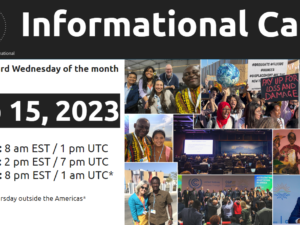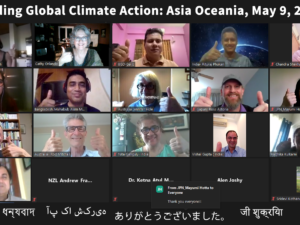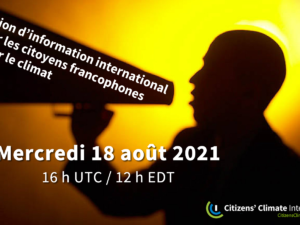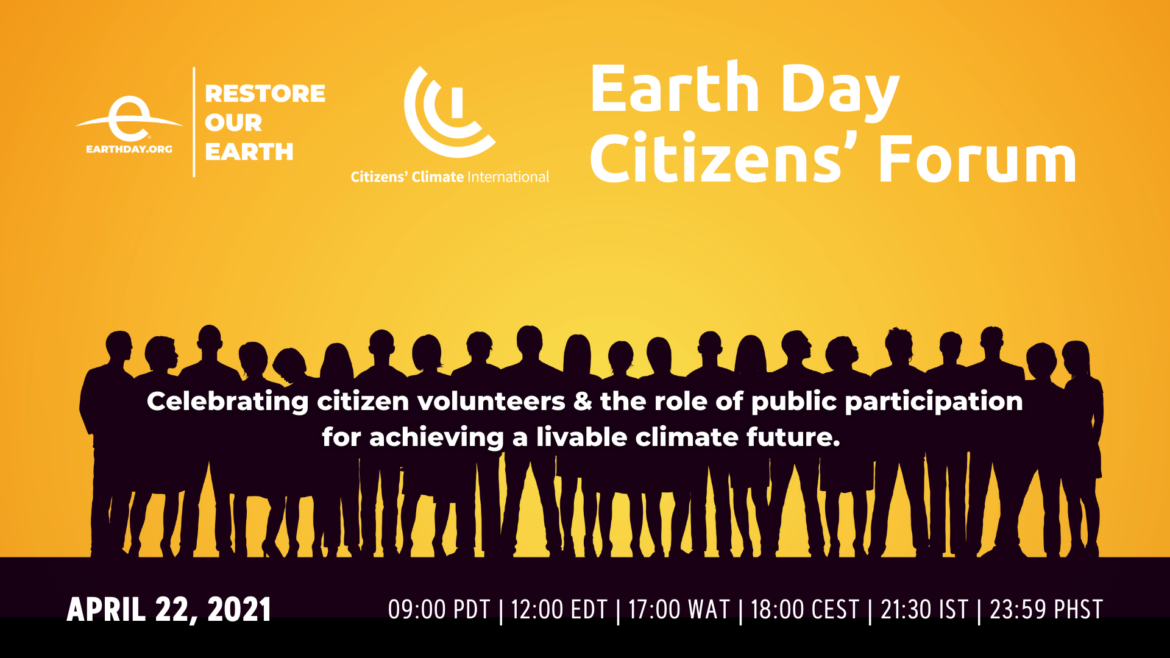
The Earth Day Citizens’ Forum—co-convened by Citizens’ Climate International (CCI) and the Earth Day Network—brought people from 6 continents together to highlight, celebrate, and build momentum for citizen participation as a catalyst for enhanced climate ambition.
Since the world agreed “to prevent dangerous anthropogenic interference with the climate system” in 1992, citizen participation has been far too marginal a part of the climate policy process. Amid rising risk of long-term economic and environmental destabilization, we cannot afford to lose time in making major gains for the health and resilience of people and Nature.
Citizen engagement is critical for restoring our Earth.
Dr. Maghan Keita, Board President of CCI, delivered opening remarks, noting that in order to achieve a world that is environmentally sustainable, we also need to see the connections to justice, including systemic racism, economic marginalization, and disenfranchisement. If we are unable or unwilling to care for our common home, how could we succeed in honoring the dignity and rights of all people?
Ms. Karuna Singh, Earth Day Network Regional Director for Asia and Country Director for India, spoke of how the Earth Day movement has grown since the first celebration on April 22, 1970. She shared how this vast collaboration is now creating an opportunity to work together to reduce harm and restore Nature:
We work in collaboration with over 50,000 organizations in some 190 countries, to take the environmental movement forward. Every human being is first a citizen of Earth, and only then are they citizens of anything else. We have to work with and through each other, and only then will there be a good climate on Earth.
Action for Climate Empowerment
Olivia Urbanski, of the US Department of State, one of two national focal points for the United Nations Climate Change participation agenda known as Action for Climate Empowerment (ACE), explained why the US sees ACE as one of the key opportunities to foster awareness and participation to achieve durable climate policy.
ACE encompasses 6 dimensions of information sharing and engagement: education, training, public awareness, public participation, public access to information, and international cooperation. The CCI view of ACE, which is shared by many in the Education, Communication, and Outreach Stakeholders (ECOS) community, is that participation is a necessary part of both the design of climate policy and the deployment of climate solutions.
We then welcomed Frank Niepold, of the US National Oceanographic and Atmospheric Administration, the other US national focal point for ACE, to the Forum. Olivia said the two:
will be working closely with non-governmental organizations, local governments, schools and universities, and communities, to help ensure that ACE work happening domestically is shared with the [UNFCCC] Secretariat and other ACE national focal points around the world…
That sharing of experiences is crucial for helping others identify scalable strategies for public engagement, which can elicit deeper-rooted, more locally relevant climate policies and national investment priorities. Frank expanded on the possibility of a US national strategy for ACE implementation, and his own experience of stakeholder engagement allowing for a more informed policy process on both sides—in government and in communities.
Isatis Cintrón, Regional Coordinator for Citizens’ Climate Latin America, then introduced a strategy to ramp up public education and stakeholder-driven ACE activity—a campaign launching today called PowerClimateAction. Today’s announcement describes the effort as:
a multi-partner campaign coordinated by Citizens Climate International (CCI), Global Council for Science and the Environment (GCSE), Climate Generation: A Will Steger Legacy, Climate Outreach, and Connect4Climate – World Bank Group, among others… The campaign will highlight the importance of leveraging a whole-of-society approach, including a strong focus on the intersection of climate and social justice, and the critical nature of providing a clear structure to measure tangible and collective progress.
The campaign is not only about access to scientific information and transparency to allow proper tracking of climate action; it is also about the right to know, and the right to play a role in shaping the conditions for a livable future.
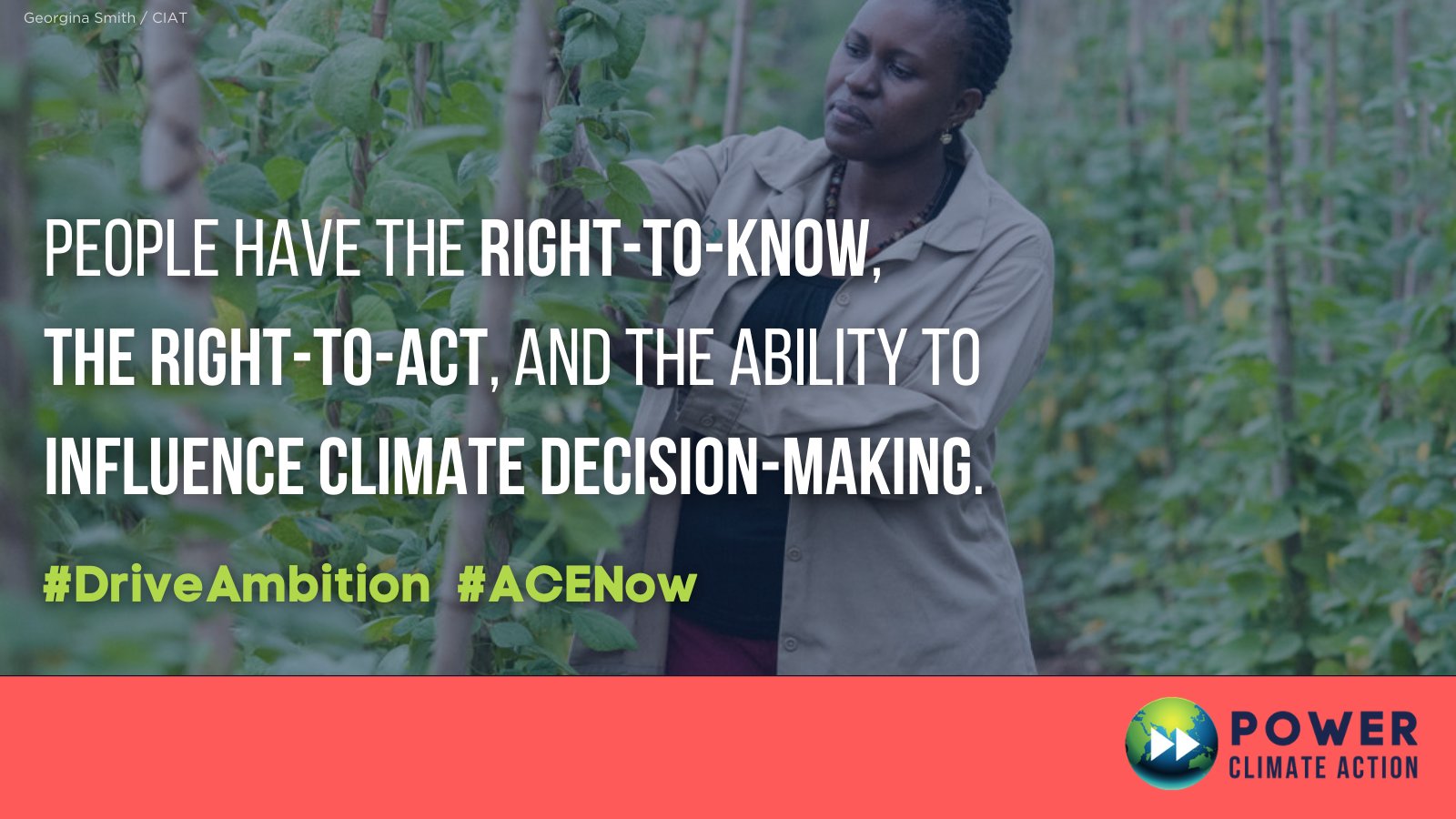
Reports from the Field
We heard from Ruth Gutiérrez-Corley, Co-founder and director for an NGO in southern Belize ‘Building Belizean Livelihoods and Environment’, and national coordinator for Belize Commonwealth Youth Climate Change Network (CYCN Belize). Her work in coastal communities touches not only volunteerism and public engagement, but also food security, climate resilience, and sustainable livelihoods.
Citizens’ Climate Europe is advocating for climate income to price carbon and improve livelihoods across Europe. They are calling on European citizens to support this policy as a fast, fair, and effective way to price carbon. Those eligible can support by signing this European Citizens Initiative proposal.
Let's get personal for Earth Day. Economists and scientists agree that a Climate Income is an effective solution for the crisis… but why else do we support it?
Show your support: https://t.co/mnxvpJqfpq#ClimateIncome #EarthDay2021 pic.twitter.com/Y5CH2rV7K3
— Climate Income Now (@ClimateIncome) April 22, 2021
CCL Australia is advocating for The Australian Climate Dividend. This network of citizen volunteers across the continent talk to their communities, to media, and to government, and work to build political will for smart, effective climate policy.
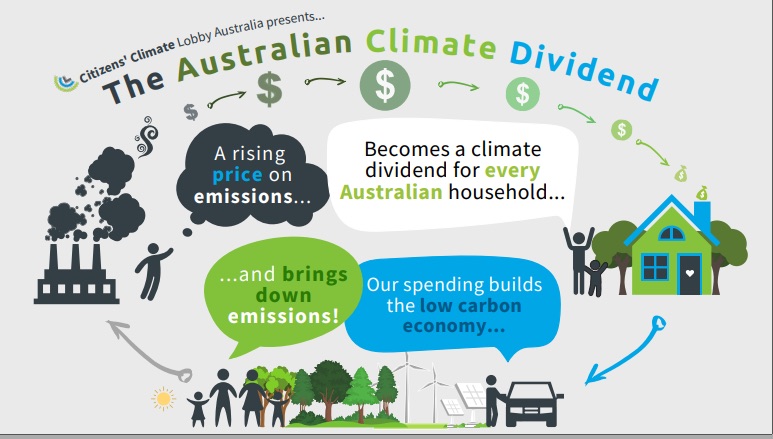
Rituraj Phukan, Coordinator of CCL India and an experienced and multi-talented climate leader, shared news of public education, publications in newspapers, meetings with public officials, and local organizing. Hundreds of millions of people in India face serious climate vulnerability, and have little in the way of resilience measures or rescue in their local communities, so there is increasing awareness that water, food, health, economic opportunity, and personal safety, all demand swift climate action.
CCI’s Field Development Lead, and long-time Regional Coordinator for Africa, David Michael Terungwa, shared the work of volunteers across the continent. Local chapters are being formed and trained, meeting regularly, and taking letters to government ministries, asking them to adopt climate income policies to strengthen their decarbonization plans, and to join the Carbon Pricing Leadership Coalition.
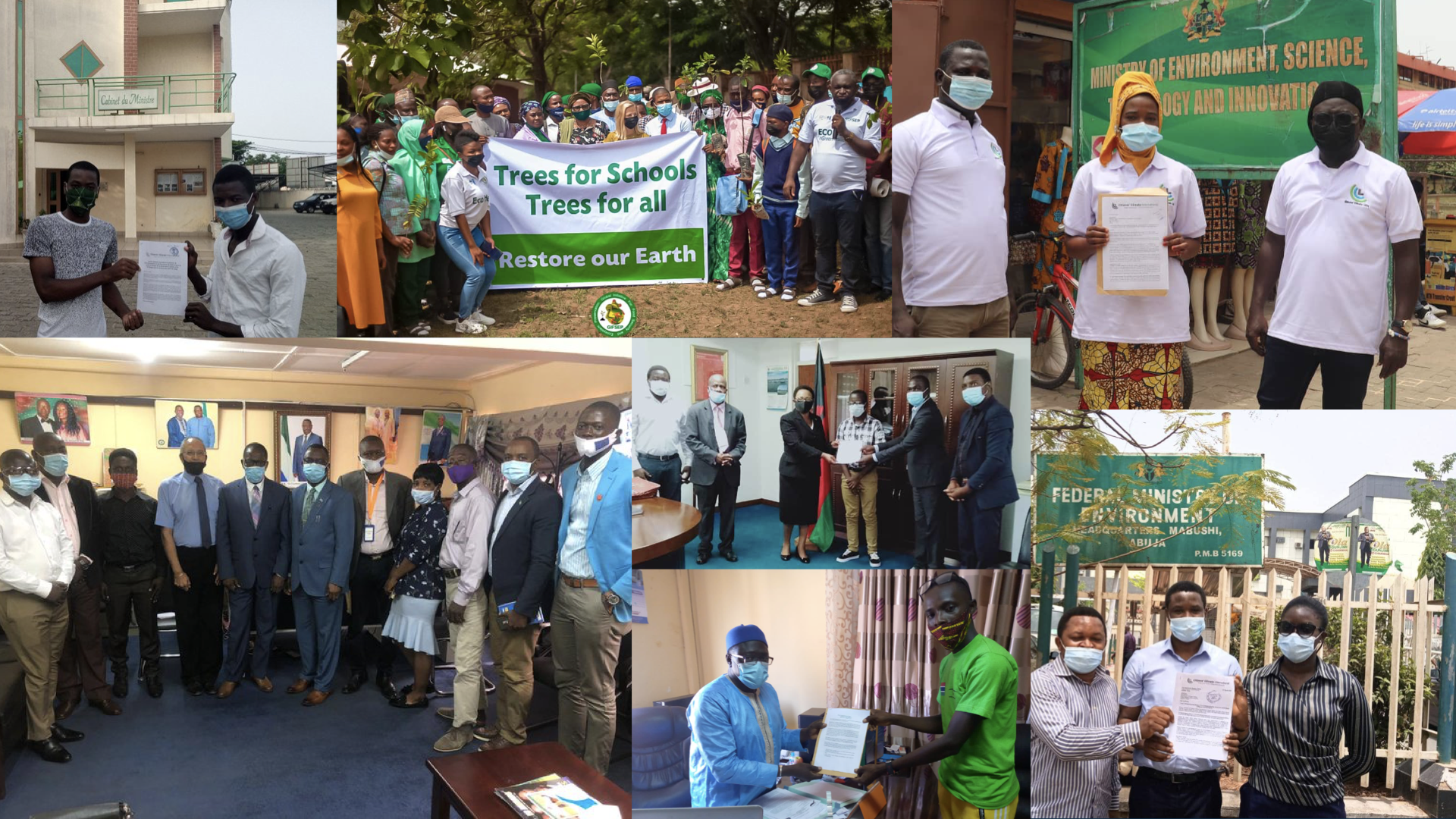
Then, we turned for a moment to the basic question of democracy itself. Jan Jan Htoi and Sandra Kong of the Global Movement for Myanmar Democracy shared the work they are doing to empower local groups of citizen volunteers to talk to their governments, from the perspective of people in the Burmese diaspora, about the urgency of supporting a return to democracy in Myanmar.
Their movement has an Earth Day campaign, including protest “parachutes” and artwork. They specifically highlighted ways in which the Myanmar military junta is a threat to environmental sustainability. Unaccountable power is not likely to serve the interests of people or of restoring and protecting Nature.
The Future We Want
Cathy Orlando, Program Director at Citizens’ Climate International, celebrated the bold climate leadership of her country, Canada. Canada is a world-leader in establishing nationwide carbon pricing, with a minimum required policy and federal backstop for non-compliant provinces and territories. That achievement is owed in no small part to citizen volunteers who spent 10 years advocating for such a national policy.
Marc G. Serré, Parliamentary Secretary for Canada’s Minister of Natural Resources, spoke of the importance of strong, sustainable climate policy. He celebrated citizen advocacy and the ways in which government and communities can work together for a healthier national economy and a future of shared prosperity.
Izzy Goldstein, Senior Campaign Manager for Zero Carbon UK, introduced a campaign to raise awareness of and support for border carbon adjustments at the G7 Leaders Summit this June in Cornwall. The EU Parliament voted in March to move forward with a carbon border adjustment mechanism (CBAM). The UK, as host of the COP26, with the US hosting a Climate Leaders Summit today, is historically positioned to drive a new paradigm of international cooperation rooted in high ambition.
Supranational Democracy and What’s Next
Our closing segment was led by Prof. Susanna Cafaro, a long-time friend of Citizens’ Climate’s international work, and our efforts to create opportunities for civic engagement beyond national borders. She leads the Supranational Democracy Foundation, and explained to our audience today why we need civic engagement to be part of intergovernmental processes.
“This is the challenge for the millennium,” she said, ”to reinvent the global political space.” That reinvention requires democratic engagement and ongoing inclusion of stakeholders in decision-making.
Whether we are talking about war, climate, human rights, or hunger, problems that transcend national borders require cooperative solutions that nation states are not always designed to implement. Citizen participation in support of that kind of international cooperation is critical for ensuring global solutions are inclusive, fair, effective, and sustainable.
Prof. Cafaro was followed by Juan Chebly, who works with the World Food Programme. From 2013 through 2015, he was part of an effort at the UN Development Programme to elicit guidance from ordinary people around the world that would shape the next 15 years of global development policy.
The MyWorld Survey reached more than 8 million people in more than 170 countries and through the World We Want platform helped to shape what we now know as the Sustainable Development Goals. The lesson is that public participation is critical for designing ambitious, durable, life-improving policy frameworks.
We closed the day with a brief from Jess Wilber—a campus leader for CCL in the US and a highly valued intern and team-member for Citizens’ Climate International. Jess shared what’s coming up for CCI and our wider engagement efforts:
- We will be publishing a report from this Forum, including more extensive Reports from the Field, from across the Citizens’ Climate International volunteer network.
- On May 12, we will hold a Technical Workshop on Climate Income Systems, in partnership with the Cleantech 21 Foundation. Please check in at our website CitizensClimate.earth for event details, coming soon.
- The UN Climate Change negotiations process will resume on May 31, with 3 weeks of virtual informal intersessional meetings. Legal decisions will not be made until the countries can meet again in person, but substantive areas of negotiation will be advanced in the informal process.
- We are working to co-convene an Open Dialogue between Governments and Stakeholders, to take place during that 3-week informal intersessional period.
- Our weekly CCI Informational Calls in May will be partly devoted to substantive stakeholder preparation for that Open Dialogue.
Jess closed with her own story of volunteer leadership and empowerment, highlighting the change that takes place when a group of people start working together to spread awareness and motivate others. Her words of thanks to those joining spoke for all of CCI, where we recognize that every person’s human contribution to climate ambition is needed.


